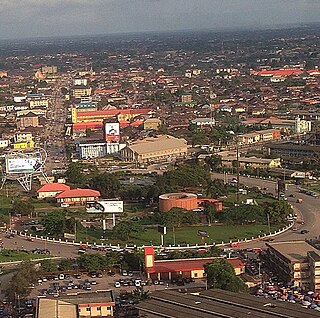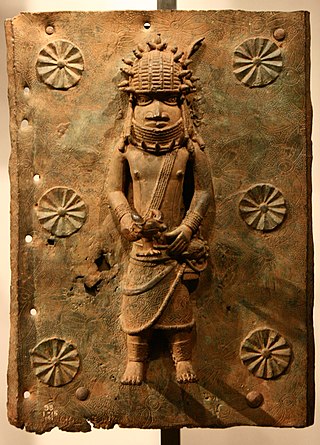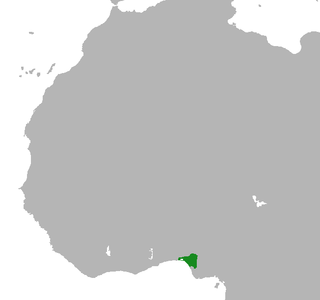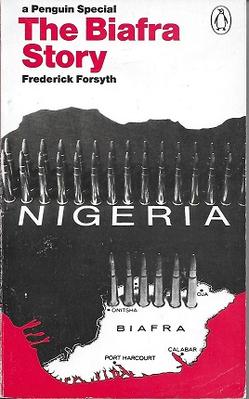Related Research Articles

Frederick McCarthy Forsyth is an English novelist and journalist. He is best known for thrillers such as The Day of the Jackal, The Odessa File, The Fourth Protocol, The Dogs of War, The Devil's Alternative, The Fist of God, Icon, The Veteran, Avenger, The Afghan, The Cobra and The Kill List. Forsyth's works frequently appear on best-sellers lists and more than a dozen of his titles have been adapted to film. By 2006, he had sold more than 70 million books in more than 30 languages.

Benin City serves as the capital and largest metropolitan centre of Edo State, situated in southern Nigeria. Notably, it ranks as the fourth-most populous city in Nigeria, according to the 2006 national census, preceded only by Lagos, Kano, and Ibadan.
The Benin Expedition of 1897 was a punitive expedition by a British force of 1,200 men under Sir Harry Rawson. It came in response to the ambush and slaughter of a 250 strong party led by British Acting Consul General James Phillips of the Niger Coast Protectorate. Rawson's troops captured Benin City and the Kingdom of Benin was eventually absorbed into colonial Nigeria. The expedition freed about 100 Africans enslaved by the Oba.The aftermath of the expedition had significant impacts on the Kingdom of Benin, including the looting of cultural artifacts and the exile of the Oba.

The Oba of Benin is the traditional ruler and the custodian of the culture of the Edo people and all Edoid people. The then Kingdom of Benin has continued to be mostly populated by the Edo.

The Bight of Benin, or Bay of Benin, is a bight in the Gulf of Guinea area on the western African coast that derives its name from the historical Kingdom of Benin.

The Benin Bronzes are a group of several thousand metal plaques and sculptures that decorated the royal palace of the Kingdom of Benin, in what is now Edo State, Nigeria. The metal plaques were produced by the Guild of Benin Bronze Casters, now located in Igun Street, also known as Igun-Eronmwon Quarters. Collectively, the objects form the best examples of Benin art and were created from the fourteenth century by artists of the Edo people. The plaques, which in the Edo language are called Ama, depict scenes or represent themes in the history of the kingdom. Apart from the plaques, other sculptures in brass or bronze include portrait heads, jewellery, and smaller pieces.

Rageh Omaar is a Somali-born British journalist and writer. He was a BBC world affairs correspondent, where he made his name reporting from Iraq. In September 2006, he moved to a new post at Al Jazeera English, where he presented the nightly weekday documentary series Witness until January 2010. The Rageh Omaar Report, first aired in February 2010, is a one-hour, monthly investigative documentary in which he reports on international current affairs stories. From January 2013, he became a special correspondent and presenter for ITV News, reporting on a broad range of news stories, as well as producing special in-depth reports from around the UK and further afield. A year after his appointment, Omaar was promoted to international affairs editor for ITV News. Since October 2015, alongside his duties as international affairs editor, he has been a deputy newscaster of ITV News at Ten. Since September 2017, Omaar has occasionally presented the ITV Lunchtime News including the ITV News London Lunchtime Bulletin and the ITV Evening News.

Micah Garen is an American documentary filmmaker and journalist whose work has focused on conflict zones in the Middle East and Afghanistan. He survived a kidnapping ordeal in Iraq in 2004. He wrote a book about the kidnapping, which included his confinement as well as the efforts of friends and relatives to secure his release; according to a report in Kirkus Reviews, the book was "extraordinarily compelling" and "gripping." In addition, Garen is a prize-winning photographer. He has written for Vanity Fair, Newsweek, The New York Times and other publications. Micah Garen and Marie-Helene Carleton have directed four documentaries for Al Jazeera's Correspondent series, including Identity and Exile: an American's struggle with Zionism featuring photojournalist Matthew Cassel. The film was awarded the top Golden Nymph prize at the Monte Carlo Television Festival in 2014. Garen has made a number of short documentaries, including one describing the lives of Egyptian women during the political upheavals in 2011 one on an American airman killed in Afghanistan and one on refugees fleeing Turkey to Greece by boat. With Marie-Hélène Carleton, Garen is working on a feature documentary from Iraq entitled The Road to Nasiriyah which was selected for Film Independent's inaugural documentary lab in 2011. Garen founded ScreeningRoom in 2015, an online community for filmmakers with tools including collaborative feedback on cuts, festival submissions and film grants.

Benin art is the art from the Kingdom of Benin or Edo Empire (1440–1897), a pre-colonial African state located in what is now known as the Southern region of Nigeria. Primarily made of cast bronze and carved ivory, Benin art was produced mainly for the court of the Oba of Benin – a divine ruler for whom the craftsmen produced a range of ceremonially significant objects. The full complexity of these works can be appreciated through the awareness and consideration of two complementary cultural perceptions of the art of Benin: the Western appreciation of them primarily as works of art, and their understanding in Benin as historical documents and as mnemonic devices to reconstruct history, or as ritual objects. This original significance is of great importance in Benin. In terms of specific imagery, leopards are identifying figures to represent the Oba of Benin as a competent and dominant force in their territory.

The Kingdom of Benin, also known as Great Benin or Benin Kingdom is a kingdom within what is now considered southern Nigeria. It has no historical relation to the modern republic of Benin, which was known as Dahomey from the 17th century until 1975. The Kingdom of Benin's capital was Edo, now known as Benin City in Edo State, Nigeria. The Benin Kingdom was one of the oldest and most developed states in the coastal hinterland of West Africa. It grew out of the previous Edo Kingdom of Igodomigodo around the 11th century AD; it was annexed by the British Empire in 1897.

An internal conflict in the Central African Republic (CAR) started essentially on 13 April 2013, when the government of President Michel Djotodia officially took over. The fighting was between the government of the Central African Republic's former Séléka coalition of rebel groups, who are mainly from the Muslim minority, and the mainly Christian anti-balaka coalition. The conflict was part of the ongoing Central African Republic Civil War (2012–present). International organisations, such as the United Nations, had warned of a possible genocide. UNSC resolution 2122 authorised the African-led International Support Mission to the Central African Republic (MISCA) to be deployed to the country, and France to lead operations with additional troops sent to bolster its force in the country. Following a summit of Economic Community of Central African States (CEEAC), including the attendance of all the country's MPs, Djotodia resigned from the presidency on 10 January 2014. The National Transitional Council chose Bangui mayor Catherine Samba-Panza as interim president on 20 January 2014. A period of lawlessness prevailed during the early days of her presidency with people moving into religiously cleansed neighbourhoods as the UN warned of a genocide. Anti-Balaka attacks continued against Muslim civilians.
Isaac Fadoyebo was a Nigerian soldier who served in the British Royal West African Frontier Force during Britain's World War II campaign in Asia.

Damien Gavin Lewis is a British author and filmmaker who has spent over twenty years reporting from and writing about conflict zones in many countries. He has produced about twenty films.
Major Richard Gabriel Akinwande Savage (1903–1993) was a physician, soldier, and the first person of West African heritage to receive a British Army commission.

James Robert Phillips was the deputy commissioner and consul for the Niger Coast Protectorate. He is remembered for his part in the events that led to the Benin Expedition of 1897. In 1897, Phillips set out to petition the Oba of Benin, although his reasons for doing so remain unclear. He and his party were ambushed and slaughtered as they approached Benin City, with Phillips being among the casualties. Though Phillips had acted without consulting the Royal Niger Company authorities, after his death the British government dispatched an punitive expedition against the Benin monarchy, which the force defeated and deposed, leading to the kingdom's eventual absorption into colonial Nigeria.

Okukor is the name given to a bronze statue of a cock from West Africa, held by Jesus College, Cambridge, from 1905 to 2021. One of the Benin bronzes, it was taken from the Kingdom of Benin during the Benin Expedition of 1897, a punitive expedition dispatched to punish the Oba of Benin after a Royal Niger Company delegation was ambushed and killed. It became controversial in 2016 as an example of looted art, with demands that the statue be repatriated back to Nigeria. It was transferred to Ewuare II, Oba of Benin, and Nigeria's National Commission for Museums and Monuments by Jesus College in 2021.

Jane Ferguson is an Irish journalist.

The Biafra Story is a 1969 non-fiction book by Frederick Forsyth about the Nigerian Civil War (1967–70) in which Biafra unsuccessfully attempted to secede from Nigeria. Reportedly one of the earliest eyewitness accounts of the war from the Biafran perspective, a revised edition was published after the war in 1977.

The Benin Dialogue Group is a multi-lateral international collaborative working group that brings together delegates from Western museums with representatives of the Nigerian Government, the Royal Court of Benin, and the Nigerian National Commission for Museums and Monuments. Its aims are cooperation between museums possessing Nigerian cultural heritage and the creation of a permanent display in Benin City, in particular the Benin Bronzes.

The Ife National Museum is a museum located in Osun State, Nigeria. The museum exhibits objects from ancient Ife, some of these objects are made of terracotta or bronze. The museum is administered by the National Commission for Museums and Monuments of Nigeria.
References
- ↑ www
.elephantprotectioninitiative .org /the-secretariat - ↑ "Loot".
- ↑ "Oneworld to publish story of Benin Bronzes and colonial dispossession | the Bookseller".
- ↑ "HWA Crown Awards 2022: The shortlists – Historia Magazine".
- ↑ Bedales Association and Old Bedalian Newsletter 2012 (Page 26 - 3rd entry) Archived 4 February 2014 at the Wayback Machine Bedales Association, 2012. Retrieved 4 December 2012.
- ↑ "Curtis Brown". www.curtisbrown.co.uk.
- ↑ Al Jazeera International announces Barnaby Phillips as European correspondent Archived 27 December 2011 at the Wayback Machine Publisher: Ameinfo.com Published: 8 February 2006. Retrieved: 4 December 2012.
- ↑ Barnaby Phillips - Europe Correspondent Publisher: Al Jazeera. Retrieved: 4 December 2012.
- ↑ Nilanjana Gupta Publisher: Nilanjana Gupta. Retrieved: 4 December 2012.
- ↑ "The Burma Boy". www.aljazeera.com.
- ↑ "SPRING 2012 CINE GOLDEN EAGLE AWARD RECIPIENTS". CINE (Council on International Nontheatrical Events). Archived from the original on 2 November 2013. Retrieved 10 August 2014.
- ↑ "Another Man's War | Oneworld". Archived from the original on 3 November 2014. Retrieved 2014-11-03.
- ↑ Blair, David (15 September 2014). "Another Man's War by Barnaby Phillips, review, 'profoundly moving'" – via www.telegraph.co.uk.
- ↑ "The forgotten flank of the forgotten corps of the Forgotten Army » The Spectator". Archived from the original on 7 September 2014.
- ↑ "NPR's Book Concierge".
- ↑ http://www.thetls.co.uk/tls/multimedia/archive/01120/Contents_Jan_9_1120902a.pdf [ permanent dead link ]
- ↑ Mark, Monica (15 August 2015). "From Nigeria to Burma's jungle: courage and compassion in the war with Japan". The Observer– via www.theguardian.com.
- ↑ "Barnaby Phillips leaves al Jazeera English".
- ↑ "Prospect's best books of 2021: history". Prospect . London. 9 December 2021.
- ↑ Herwitz, Daniel (3 March 2021). "Can museums adapt to a changing world?". Financial Times.
- ↑ "The looted Benin bronzes should be returned". The Economist. 31 March 2021.
- ↑ "Two new books about the Benin bronzes: The pressure ramps up". 26 March 2021.
- ↑ "Loot: The ongoing conflict over African artefacts in European hands".
- ↑ Crompton, Sarah. "Loot by Barnaby Phillips review — the fight over the Benin Bronzes".
- ↑ "The problem of the Benin Bronzes will never go away | the Spectator". 22 April 2021.
- ↑ Varadarajan, Tunku (4 June 2021). "'Loot' Review: Plunder's Revenge". Wall Street Journal.